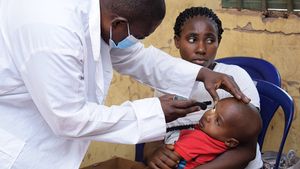
Treatment GuideJust DiagnosedSex & DatingAfrican AmericanStigmaAsk the HIV DocPrEP En EspañolNewsVoicesPrint IssueVideoOut 100
CONTACTCAREER OPPORTUNITIESADVERTISE WITH USPRIVACY POLICYPRIVACY PREFERENCESTERMS OF USELEGAL NOTICE
© 2025 Pride Publishing Inc.
All Rights reserved
All Rights reserved
Scroll To Top
By continuing to use our site, you agree to our Private Policy and Terms of Use.
Ongoing racial disparities in the nation's HIV infection rate are an "indictment" of the U.S. response to the epidemic, according to a study published in the November 2009 issue of the American Journal of Preventive Medicine. "Continuing racial disparities in HIV infection more than two decades after the identification of the virus and availability of an accurate test are an indictment of the U.S. response to the epidemic," says study lead author Adaora A. Adimora, MD, MPH, a professor of infectious diseases in the University of North Carolina at Chapel Hill School of Medicine. "Existing interventions have failed to control the epidemic in African-Americans in part because critical features of [socioeconomics] promote behaviors that transmit HIV and increase the risk of HIV infection, even among those who do not have high-risk behaviors." Adimora and her fellow researchers decided to examine the factors responsible for the stark racial disparities in HIV infection in the United States and the now-concentrated epidemic among black Americans. HIV prevalence among African-Americans is 10 times greater than the prevalence among their white counterparts, according to collected data. This racial disparity in HIV prevalence has persisted, Adimora points out, in the face of both governmental and private actions, involving many billions of dollars, to combat HIV. The Centers for Disease Control and Prevention estimates that 45% of new HIV infections in the United States in 2006 occurred among non-Hispanic blacks. Among the 13,184 adolescents and young adults in the National Longitudinal Study of Adolescent Health, a nationally representative study, HIV seroprevalence was almost 0.5% among black Americans -- a rate 20 times that of white Americans in the study. While individuals' sexual behaviors can contribute to the disparity in HIV prevalence, according to Adimora, these differences in individual behaviors do not fully explain the marked racial differences in HIV infection prevalence. Even when comparisons are broken down by education, poverty level, marital status, age at first sexual intercourse, lifetime number of sex partners, history of male homosexual activity, illicit drug use, injection-drug use, and herpes simplex virus-2 antibody positivity, HIV prevalence among African-Americans exceeds that of whites, and it does so typically substantially. According to the team, the overall impact of these factors constitutes "structural violence," a social system characterized by inequalities in power and life of sufficient magnitude to restrict a group of people from realizing their full potential and "put them in harm's way." "There is a need for research and interventions that are informed by expertise in public health, medicine, basic science, and social sciences," Adimora states, "along with expertise in economics, business and finance, education, criminal justice, political science, and other disciplines. Governments should be held accountable for progress -- or lack thereof -- in eliminating inequities."
From our Sponsors
Most Popular
Lexi Love comes out as HIV+ after Trump deletes federal resources
January 23 2025 11:23 AM
Ricky Martin delivers showstopping performance for 2024 World AIDS Day
December 05 2024 12:08 PM
Trump's orders prompt CDC to erase HIV resources
January 31 2025 5:29 PM
Meet our Health Hero of the Year, Armonté Butler
October 21 2024 12:53 PM
California confirms first case of even more deadly mpox strain
November 18 2024 3:02 PM
This long-term HIV survivor says testosterone therapy helped save his life.
December 16 2024 8:00 PM
Plus: Featured Video
Latest Stories
Broadway's best raise over $1 million for LGBTQ+ and HIV causes
April 03 2025 7:15 PM
Jess King is here to help you live your happiest, healthiest life yet
March 24 2025 4:35 PM
Celebrating Black History Month with our annual African American issue
February 01 2025 3:28 PM
Plus nominated for 2025 GLAAD Media Award
January 22 2025 12:42 PM
Hollywood must do better on HIV representation
December 01 2024 9:00 AM
Check out our 2024 year-end issue!
October 28 2024 2:08 PM
Twice-yearly injectable lenacapavir, an HIV-prevention drug, reduces risk by 96%
October 15 2024 5:03 PM
The Talk Season 5 premieres this spring with HIV guidance for the newly diagnosed
March 26 2025 1:00 PM
Discover the power of Wellness in your life
March 26 2025 12:41 PM
BREAKING NEWS: Trump admin moves to end federal HIV prevention programs
March 18 2025 6:10 PM
Tyler TerMeer vows to continue to fight for health care for all
January 28 2025 3:00 PM
A camp for HIV-positive kids is for sale. Here's why its founder is celebrating
January 02 2025 12:21 PM
AIDS Memorial Quilt displayed at White House for the first time
December 02 2024 1:21 PM
Climate change is disrupting access to HIV treatment
November 25 2024 11:05 AM
Season 4 of The Switch on resilience & radical self-love returns this spring
March 26 2025 12:20 PM
Gerald Garth is keeping people of color happy and healthy through trying times
March 11 2025 3:38 PM
'RuPaul's Drag Race' star Trinity K Bonet quietly comes out trans
December 15 2024 6:27 PM
Decades of progress, uniting to fight HIV/AIDS
December 01 2024 12:30 PM
Post-election blues? Some advice from mental health experts
November 08 2024 12:36 PM
AIDS/LifeCycle is ending after more than 30 years
October 17 2024 12:40 PM












































































